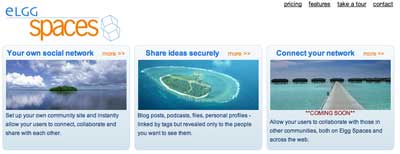Run your own 'MySpace' with Elgg Spaces

Launched earlier this week, Elgg Spaces is a new hosted service from Curverider (a young British startup) that enables anybody to create and run their own social networking site. The service is based on the open source social networking platform, Elgg (of which Curverider's founders are the main developers), which has until now, found a home primarily within education - consequently appearing under the web 2.0 hype-machine's radar. However, Elgg has a rich feature-set that should appeal to users well beyond academia. These include blogging, a file repository (with podcasting capabilities), online profiles, and an RSS reader. Additionally, all of a user's content can be tagged with keywords, so that they can connect with other users who have similar interests.

A free version of Elgg Spaces is available (for up to 50 users, with advertising, and no support). Fully supported and ad-free packages start from £50 per month (approx $95) for up to 200 users, after which the price increases as you factor in more users.
In an email exchange with Curverider co-founder, Ben Werdmuller (also Technical Director of Elgg), I asked what differentiates Elgg Spaces from competing offerings, and also got Ben's take on where social networks might be heading.
Who is Elgg Spaces aimed at?
Elgg Spaces is aimed at anyone who needs to connect to a group of people and share thoughts, information and files with them. This could be a class, a society, a small business - or it might be that you want to connect people in your town together, or people with a similar interest.
What makes Elgg Spaces different from other social network offerings?
When you sign up to Elgg Spaces, you get a whole social networking site to yourself, that you can customise, bring your friends and colleagues into and share in a personalised space. If you don't want the outside world to come in, they don't have to - or, you can open the network up and take advantage of the powerful access controls.
Everything in an Elgg Spaces site is linked via cross-site tagging. So let's say you're looking at my profile, and it says that I'm interested in social software. I click on social software and suddenly see not just everyone else interested in social software, but also all the relevant blog posts and files. I can then subscribe to that search via RSS and keep tabs on any new content or people relevant to my interests.
Crucially, I only see the content that people have made available to me; everything has an access control on it. That means, when I post to my blog, upload a file or fill in a field on my profile, I can restrict that information to three of my closest friends or leave it open to the whole world.
There's also RSS across everything. If you upload an MP3 to your files and tag it 'podcast', for example, people will be able to subscribe to your feed of files tagged with podcast. (It will also actually work as a podcast feed.) If you maintain a Wordpress blog and want to keep using it while using the other features on your Elgg Spaces site, you can take your Wordpress feed and use it to autopopulate the Elgg Spaces blog. You might want to automatically publish your Flickr photos when you upload them, for example; that's all possible.
This stuff is a long way away from the likes of MySpace or Facebook, where you upload a profile and post up a few notes or photos. Elgg Spaces essentially allows you to have your own MySpace.
Who do you envisage using the free service, and who the paid service?
The Elgg platform came out of education, and a lot of educational users have very little budget. With Elgg Spaces a teacher can come along and have a network for their class for free. Similarly clubs or organisations that don't have a lot of money but would like to take advantage of the power that social networking can give them. At the same time, for some schools or organisations, having ads on a service isn't appropriate, or they may want to bring in more users than the free service allows.
Do you think meta-networks are the future of social networks, and where do you think we’re heading in the next few years?
I think in the future, networks or meta-networks won't be an issue: the network will be decentralised. What I'd like to see is a set of open protocols that mean you can connect to anyone, anywhere, no matter which site they happen to be using. I might have my profile on Elgg.net; you might have yours on ZDNet; we might both want to connect to someone on LinkedIn. We'll just be able to click and add these people to our personal networks of people, no matter what services they happen to be using. I will then be able to keep track of what all my contacts are doing, without caring what tool they're using to create content, using the tool of my choice to view the information, wherever each of these things might be hosted.
The market then changes from a series of closed networks that don't talk to each other to something more like the web as a whole. I think this democratic soup of tools, information and digital identities is where Web 2.0 is destined to go.